Investor interest last week was split between U.S. Federal Reserve Chairman Ben Bernanke's semi-annual testimony to Congress and a plethora of gross domestic product releases in Europe and Asia. It was Bernanke's first semi-annual testimony before the new Democratic majority. When it was over, he got high marks from both Democrats and Republicans with one congressman noting that he understood what the chairman was saying. The Fed's forecast of a benign slowdown cheered equity investors worldwide and stock indexes climbed. The Dow continued to reach a new all time peak during the week, while indexes in Europe and the UK pushed towards new six-year highs. However, the rallies ebbed at week's end on disappointing U.S. data.
The foreign exchange markets were not as sanguine and the dollar dropped against most major currencies including the yen and the euro. The yen and euro also gained on generally better-than-expected first estimate gross domestic product data.
On the week, all indexes with the exception of the Hang Seng were higher despite generally weak closes on Friday. Most equities were buoyed midweek by better-than-expected fourth quarter growth in the eurozone and Japan.
Global Stock Market Recap

Europe and the UK
The DAX, CAC and FTSE were up last week despite declines on Thursday and Friday because investors were worried that earnings growth could be slowing. The three indexes had reached six-year highs earlier in the week primarily because of favorable earnings growth. Mining shares such as Rio Tinto Group and Anglo American Plc declined after China restricted bank lending, a step that is likely to reduce metals demand. Mining companies have been the best performing shares in the past month on speculation that Asian growth will continue to fuel metals sales. BHP Billiton, the world's biggest mining company, posted record profit this month and said China will remain the main demand driver for raw materials. Oil majors also were up as oil prices recovered on expectations of stronger demand from the U.S. because of recent below normal temperatures.
The FTSE 100 broke the 6,400 barrier in opening trade on Wednesday for the first time since mid-December 2000 helped by reports that private equity firms were interested in Wolseley, a plumbing and building materials group. This prospect faded however and accounted in part for losses on Thursday and Friday.

Bank of England Inflation Report
According to the latest Inflation Report, price increases are expected to fall below the government's 2 percent inflation target within the next year. However, this might not be enough to prevent further interest rate increases. Although the economy is expected to grow at or above trend, a sharp drop in energy and fuel costs is expected to put downward pressure on inflation. Bank of England Governor Mervyn King said the outlook for inflation is "highly uncertain." The Bank noted that economic output growth had been strong since its November 2006 report because consumer spending has accelerated over the past year and business investment has picked up sharply. In addition, world growth has picked up while some of the downside risks appear to have diminished.

King also said the pound sterling's high exchange rate has been a cross the economy has had to bear over the past decade. The Bank of England's forecasts have again been altered by sterling's unexpected recent strength. It is now assuming the currency will stay strong for the next three years, dropping only 1.7 percent against a basket of other currencies, weighted according to Britain's trade in manufactured goods. Sterling has recovered from the lows sustained after its ejection from the European exchange rate mechanism in 1992. And it has remained high against repeated predictions of a decline.
Asia/Pacific
Five of six Asian/Pacific indexes were up last week. Only the Hang Seng was down on the week despite its rebound from Tuesday's 2.2 percent drop as Asian equities responded positively to a combination of robust Japanese growth data and reassuring comments about the U.S. economy from Fed chairman Ben Bernanke. But in Friday trading, export-related equities were lower after the U.S. dollar declined on weak economic data that showed a mixed picture of the economy.

The good news for the Nikkei and Topix was the fourth quarter 2006 GDP report. The economy grew at its fastest pace in three years and above analysts' expectations. GDP was up 1.2 percent on the quarter and an annual rate of 4.8 percent. This in turn fueled expectations that the Bank of Japan will increase interest rates at its meeting this week. It should be noted that each pre-meeting buildup has ended in disappointment for those who bet the BoJ would finally increase rates from their 0.25 percent level. The BoJ's monetary policy board surprised analysts by deciding against a rate increase in January after intense political pressure. The Japanese government, which wants to avoid a premature rate increase that could undermine the economic recovery, has been accused of pressuring the central bank.
Currencies
Bumpy week for yen
The yen fell to a new all-time low against the euro on Monday after the Group of Seven communiqué avoided direct comments acknowledging the currency's weakness. G7 did acknowledge U.S., UK, Canadian and eurozone growth and noted that Japan's recovery is on track and expected to continue. The G7 also said it's confident that the implications of these developments would be recognized by market participants and would be incorporated in their risk assessments. Analysts interpreted this to mean that it would be the market's job to correct yen undervaluation and reconsider the merits of the carry trade in the current low volatility environment. But the better-than-expected GDP report revitalized the yen as analysts saw better chances that the Bank of Japan will increase its key interest rate at this week's meeting. Low Japanese interest rates have been the driving force behind carry trades, in which long positions in high-yielding currencies are funded by selling low-yielding currencies such as the yen. Indeed, investor appetite for carry trades has helped send the yen down to a series of multi-year lows against the dollar, euro and pound in recent weeks.

Indicator scoreboard
EMU - Fourth quarter flash gross domestic product was up 0.9 percent and 3.3 percent when compared with the same quarter a year ago. As with all flash estimates, no detail is available. The flash estimates for Germany, France, Spain and Italy were higher than anticipated by analysts.

December industrial output soared by 1 percent and 4 percent when compared with the same month a year ago. Output was up in all countries with the exception of Germany. Intermediate goods output jumped by 2 percent after a flat November while energy output was up 1.7 percent after increasing 0.5 percent in November. Both capital-goods and consumer-durables output were up a subdued 0.3 percent after both soared 1.4 percent in the previous month.

Germany - Fourth quarter flash gross domestic product was up 0.9 percent and 3.7 percent when compared with last year. While no detail is available with the flash estimate, the Statistics Office said that growth was pervasive across all sectors of the economy.

February ZEW expectations index was 2.9, up from negative 3.6 in January. Current conditions index reached another new all-time high at 70.9. ZEW said that analysts appeared to expect domestic investment spending to "develop dynamically" and consumer spending to stabilize. ZEW surveyed 309 German financial experts for their opinions on current economic conditions and the economic outlook for major industrial economies between January 29 and February 12.

France - Fourth quarter flash gross domestic product was estimated to have increased between 0.6 and 0.7 percent on the quarter after a flat third quarter. No other data were available.

Italy - Fourth quarter gross domestic product was up 1.1 percent and 2.9 percent when compared with the same quarter a year ago. The quarterly increase was the fastest in seven years. No detail was available, however the Italian statistics office, Istat said that services, manufacturing and agriculture all were up on the quarter.

Britain - January consumer price index dropped 0.8 percent and was up 2.7 percent when compared with the same month last year. Prices for food and transport dropped. The retail price index was down 0.5 percent but increased 4.2 percent on the year. The retail price index excluding mortgage interest payments (the Bank of England's former inflation index) dropped 0.7 percent but was up 3.5 percent on the year. The largest downward effect on the RPI annual rate came from household goods, where there was a record month-on-month fall in furniture prices with widespread price cuts across a range of items. This follows a record increase in the previous month.

January producer output prices were up 0.3 percent and 2.1 percent when compared with last year. Core output prices, which exclude food, alcohol, tobacco and petroleum, were up 0.2 percent and 2.2 percent on the year. Producer input prices sank 2.1 percent and were down 1.6 percent when compared with last year. The drop was primarily due to plummeting crude oil prices which were down 11.4 percent on the month and 20.3 percent on the year.

January retail sales volumes dropped 1.8 percent but were up 3.2 percent when compared with last year. The drop more than offset December's 1.1 percent gain. Household goods store sales sank 4.2 percent, while clothing dropped 4.4 percent and non-food store sales were down 3.4 percent. Food sales, which account for about 50 percent of all sales, edged down 0.1 percent.

Average earnings for the three months ending in December were up 4 percent when compared with the same three months a year earlier. This is comfortably below the Bank of England's target of 4.5 percent. Excluding bonuses, average earnings were up 3.7 percent. Average earnings including bonuses were up 4.5 percent in manufacturing, 4.2 percent in the services sector, 3.2 percent in the public sector and 4.1 percent in the private sector.

January claimant count unemployment was down 13,500, reducing the claimant count unemployment rate to 2.9 percent. The International Labour Organisation unemployment rate for the three months ending in December was 5.5 percent for the third month. The number of unemployed declined by 23,000. While National Statistics states that the ILO unemployment rate is the official rate, most market watchers prefer the claimant count rate because it is timelier.
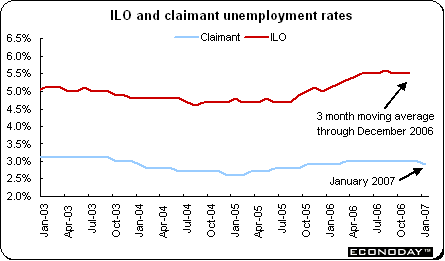
Asia
Japan - January corporate good price index was down 0.2 percent and up 2.2 percent when compared with a year earlier. The decline was attributed to softer crude oil prices. The Bank of Japan's overseas commodity index - a weighted average of prices of 16 commodity markets including crude oil, copper and aluminum - was down 1.5 percent from a year earlier, the first decline since April 2003.
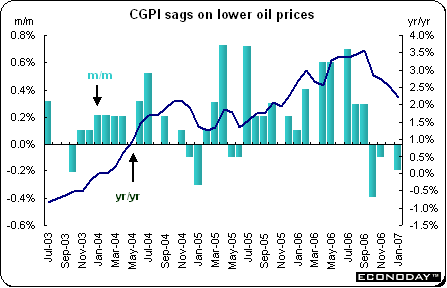
Fourth quarter gross domestic product was up 1.2 percent and 2.3 percent when compared with the same quarter a year ago. On an annualized basis, GDP was up 4.8 percent. Consumer spending, which makes up more than half of GDP, was up 1.1 percent on the quarter, reversing the third quarter drop. This was the eighth consecutive quarter of growth. Corporate spending on factory and office upgrades along with relatively well-balanced growth in domestic demand and exports contributed to the quarter's improved growth.
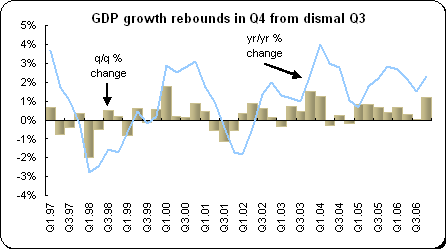
December tertiary index was down 0.4 percent but was up 0.9 percent when compared with last year. Unseasonably warm weather led to declines in wholesale and retail trade as consumers put off buying winter goods. Of the industries represented by the index, 40 percent are involved in consumption activity and are considered a reflection of consumer spending trends. The tertiary index measures activity in 11 service industries including utilities, transportation, telecommunications, wholesale and retail. Tertiary industry output accounts for 60 percent of Japan's gross domestic product.
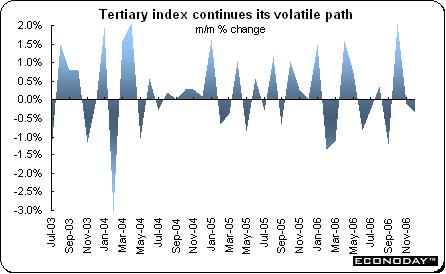
Americas
Canada - December merchandise trade surplus was C$5 billion, up from C$4.7 billion in November. Exports were up 3.8 percent while imports were up 3.6 percent. Contributing to the increase in exports were automotive products, which posted a strong 8.4 percent, and industrial goods, which were up 2 percent. Energy export values were up 5.8 percent mainly on the strength of natural gas. Natural gas exports posted a 12.8 percent increase in December as both prices and volumes increased for the month. Contributing to the import gains were autos, energy and other consumer goods.
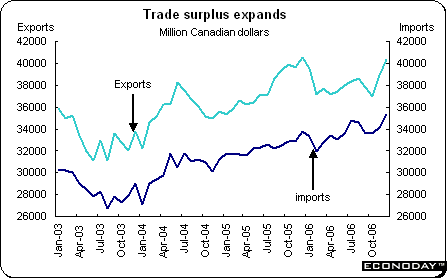
December factory shipments were up 1.7 percent but down 0.8 percent when compared with the same month a year ago. The increase was widespread, with 13 sectors representing 74 percent of total output improving. The transportation sector, led by automobiles, shipped C$10.2 billion worth of product in December, the first time in 2006 that it had surpassed the C$10 billion mark. Durable goods shipments jumped 3.0 percent while non-durable goods shipments edged up 0.2 percent. Higher shipments of petroleum and coal were nearly offset by declines in chemicals. Motor vehicle shipments increased 7.2 percent while aerospace shipments were up 4.1 percent. New orders were up 2.1 percent and 1.6 percent on the year. The increase was almost entirely the result of a $746 million surge in orders in the transportation equipment sector. Excluding transportation, new orders would have risen by 0.7 percent. Unfilled orders increased 2.1 percent to the highest level in four years. The transportation equipment sector, aerospace and motor vehicles, typically account for half of all unfilled orders in the manufacturing sector.
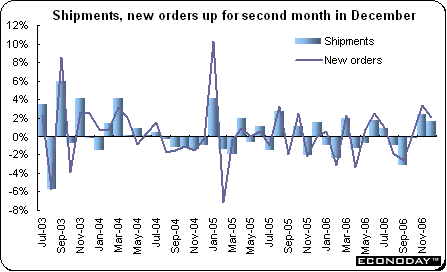
Bottom line
Interest was high last week as the international markets focused on Fed Chairman Ben Bernanke's congressional testimony and fourth quarter GDP releases - especially that of Japan. Better-than-expected data pleased equity investors.
The main event this week is the Bank of Japan's monetary policy board meeting. Given the better-than-expected GDP data released last week, many analysts are once again looking for an interest rate increase. Markets will be closed in Hong Kong, Singapore and South Korea along with many other Asian markets for several days this week. Happy New Year to those celebrating the Year of the Pig! It is the year 4705.
Markets in China and Taiwan will be closed for the entire week beginning Monday for Lunar New Year celebrations. Exchanges in Hong Kong, Singapore and Malaysia will reopen Wednesday, while South Korea will open Tuesday.
Looking Ahead: February 19 through February 23, 2007

Anne D Picker is the author of International Economic Indicators and Central Banks.

